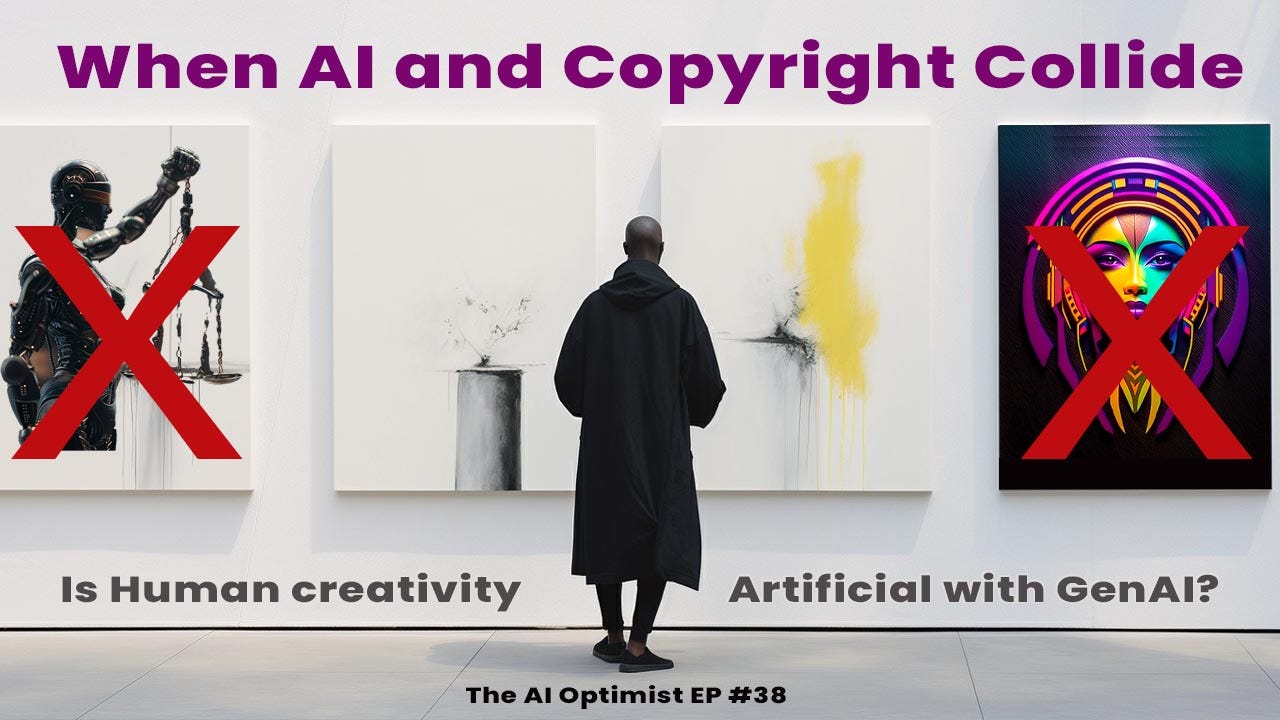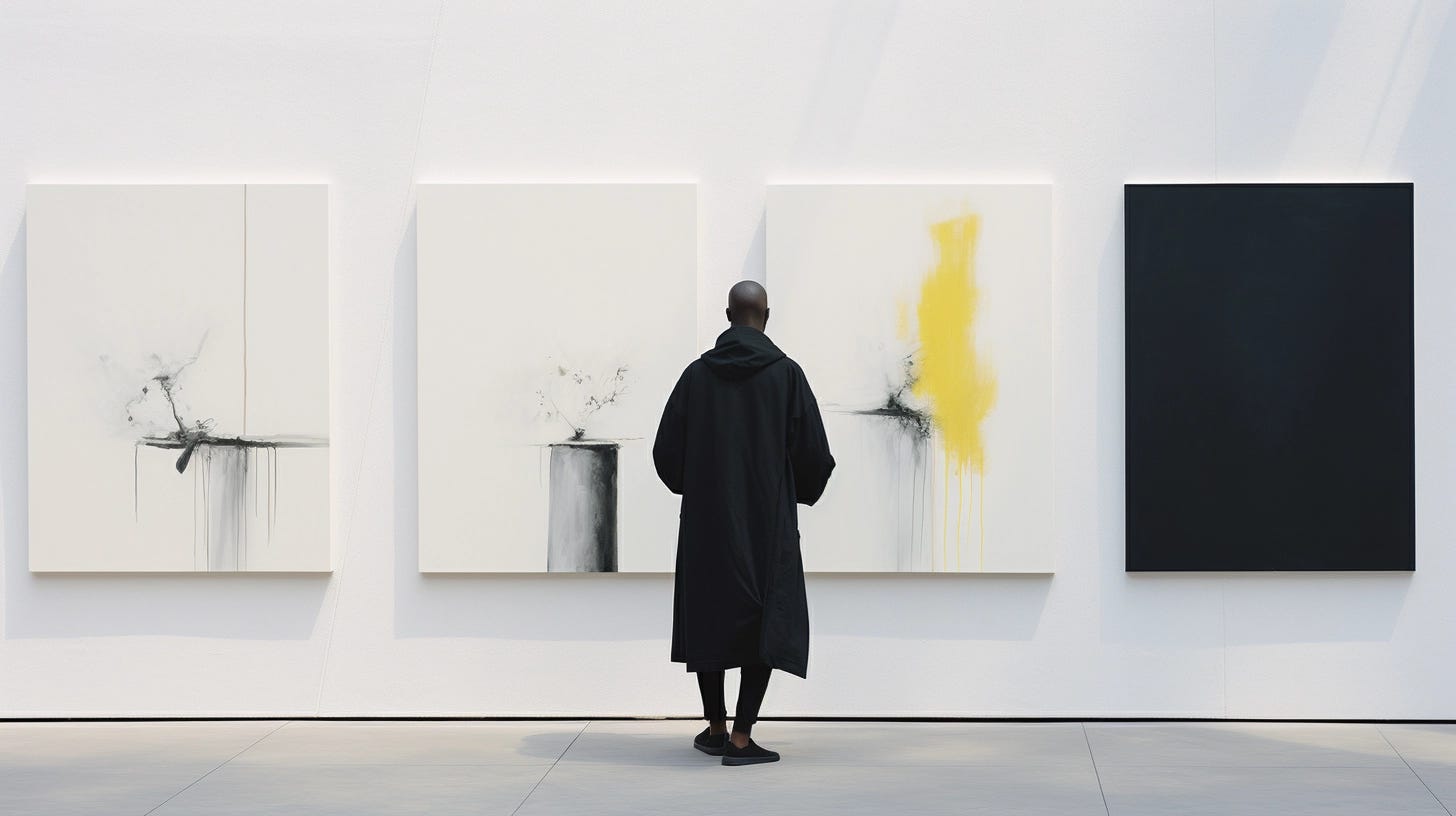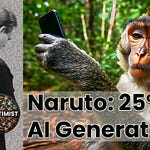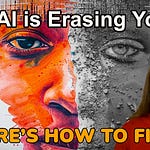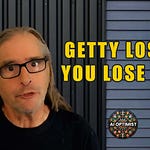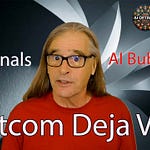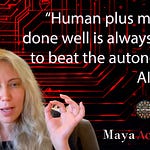Is Human Creativity Artificial with AI?
And what does it have to do with the old story of Napster and the evolution of digital music?
Prepare for a thought-provoking conversation as we unravel the clash between AI technology and copyright law, where licensing rules and individual human rights dance around the new creation process.
Our guest author, AI patent attorney Robert Plotkin, opens the door to new possibilities while contemplating the delicate balance between AI's contribution and human creativity.
This is not legal advice; I’m not an attorney, Robert is a patent attorney, and we’re sharing views on AI copyrights as authors.
Beyond practical safety risks, AI also impacts human creativity and identity. As Robert Plotkin states,
"It means we could end up engaging in creative work in this bland way that doesn't exercise our creative juices in the way we want to."
Episode 38 Playlist (summaries below)
00:00 Creativity and GenAI - Copyrights human only?
01:05 What happens with copyright data used to train models like ChatGPT?
02:00 Napster did to music what AI will do to???
03:25 AI Assisted vs. AI Generated - what's up?
07:23 What are the risks for creators?
09:16 Automation bias happening
10:30 Over reliance? Always check AI results
12:11 Closing - it's simply Creative Identities
Plotkin, author of "The Genie in the Machine" (2009) - how computer-automated inventing aka AI - and the upcoming AI Armor book, is a seasoned patent attorney who navigates the shifting dynamics of software patents, like AI.

Join us as we explore Plotkin's insights on the future of AI-driven creativity, the evolving landscape, and the licensing promise of intellectual property rights in the digital age.
By leaning too heavily on AI assistance, creators may produce work that needs the genuine spark of human ingenuity and imagination. There's a risk of falling into a pattern of generating,
"bland stuff that's even worse than what we could have done without the tools,"
as Plotkin warns.
When an AI tool is involved in creating a work, the question arises: Who is the true creator? As Dunn ponders,
"Did the tool create it? Did I?"
This question touches on the broader issue of anthropomorphizing AI – the tendency to ascribe human-like qualities and agency to these systems. Plotkin cautions against this, reminding us that AI is not a competitor or adversary but a tool to be used judiciously and with a clear understanding of its limitations.
When used responsibly, these tools enhance human creativity rather than replace it. They offer new perspectives, generate fresh ideas, and streamline specific aspects of the creative process.
The key, as Plotkin emphasizes, is to remain,
"focused and conscious in how we use the tools and
how we review and rely on and use its outputs."
It strikes the right balance, where AI aids and inspires human creators, who keep in control and choose the direction of the creative work.
It’s a new way of doing what we’ve always done, with help from the collective intelligence of people.
The Future of Creativity - Copyright Questions in the Age of Generative AI Age
While GenAI, like ChatGPT, is integral to creative work today, Episode 38 of The Ai Optimist invites a debate surrounding copyright issues and the future of creativity. This episode expands upon that conversation, exploring the impacts of AI on copyright laws, creator rights, and the essence of human creativity.
Creativity and GenAI - Are Copyrights Human-Only?
AI raises pivotal questions about copyright's nature. AI tools trained on vast datasets, including copyrighted material, generate outputs that blur the lines between original and derivative works challenges.
This scenario challenges the traditional notion that copyrights are inherently human-centric, sparking a debate on whether AI-generated content deserves its category of protection or regulation.
The Napster Moment for Creative Content
Just as Napster revolutionized the music industry, AI technologies are poised to transform creative content across mediums. The comparison highlights a potential shift in content consumption and distribution, suggesting that AI could democratize content creation while raising concerns about the devaluation of individual creativity and infringement on existing copyrights.
Napster wasn't temporarily closed due to lawsuits; Steve Jobs and iTunes settled it with licensing, and others did. That licensing model deeply hurts musicians and artists in terms of income while benefiting more prominent companies.
Is GenAI a Napster déjà vu?
Review of what we cover in each section of the Episode 38 Playlist
00:00 Creativity and GenAI - Copyrights human only?
As AI generation tools become more advanced each month, questions arise about the ownership and copyrights of AI-assisted creative works.
Traditionally, copyright protection is only for human-generated content. Still, the increasing involvement of AI in the creative process complicates matters.
Plotkin raises this issue, stating,
"It means we could end up engaging in creative work in this very bland kind of way that doesn't exercise our creative juices in the way that we want to."
The concern is that AI-generated content may need a more genuine human spark and ingenuity that defines true creativity.
This concern extends to the question of authorship and ownership.
As Dunn ponders,
"Did the tool create it? Did I?"
When an AI tool is involved in creating a work, it becomes unclear who the creator is and who should hold the copyright.
01:05 What happens with copyright data used to train models like ChatGPT?
AI models train on vast amounts of online data, some of which may be protected by copyright. The data training and permissions involved raise legal questions about the fair use of copyrighted material for training AI systems.
While the training process itself may be fair use, the potential for AI models to generate content that infringes on existing copyrights remains. Clear guidelines and legal frameworks are needed to protect the rights of creators.
02:00 Napster did to music. What will AI do to it?
Just as the Napster revolution disrupted the music industry, AI is poised to shake up various creative fields. Both scraped their content without permission.
Plotkin shares that lawsuits didn't stop Napster; licensing arose that defines the music industry today. He shares how Steve Jobs, with Apple iTunes, began to license volumes of music. The industry shifted and many musicians are paid far less for their content, while the big companies benefit.
The ease and accessibility of AI generation tools could lead to an explosion of content, both original and derivative, challenging traditional notions of authorship, ownership, and monetization.
Industries like writing, art, and design may face a wave of AI-generated content undermining the value and exclusivity of human-created works.
This disruption forces a reevaluation of business models and new approaches to protecting and compensating creatives.
03:25 AI Assisted vs. AI-Generated - what's up?
The boundary between AI-assisted and AI-generated creative works is a work in progress. AI-assisted creation -- using AI tools as collaborators or aids in the creative process – keeps human creators in ultimate control as authors.
AI-generated content produced entirely by AI systems, with little to no human input or oversight, is a creative exercise initiated and completed by a human being.
What is the authenticity and value of such works; will it remove the need for human creators?
Striking the balance between leveraging AI and preserving human creativity is central. As Plotkin advises,
"It's a matter of striking the right balance, where AI serves as an aid and inspiration, but human creators retain their agency and creative sovereignty."
Next time you go to ChatGPT or Claude or whatever LLM, stare at that blank box on the screen. Does it do anything or require you to ask questions, follow up, and review?
Like it or not, human beings are central to all GenAI, not just in the original creations but also in the asking of questions. We are creating new content together; otherwise, AI would just do it by itself.
(Yes, that's possible, so are good things. It's all perspective in one sense.)
07:23 What are the risks for creators?
The rise of AI tools presents opportunities and risks for creators. AI tools enhance creativity, offering new perspectives, ideas, and more information than most humans could handle.
Still, the risk of over-reliance on AI, leading to a loss of creative identity and the production of "bland stuff," as Plotkin warns, is a looming challenge.
Like GPS maps we all follow, losing the skills to navigate a road doesn't mean much until you have to use a map when your GPS is down. Too much GenAI could lead to Overreliance.
Plotkin highlights the potential danger of using AI-generated content without proper review and verification, especially in safety-critical situations like healthcare.
Creators must remain vigilant and exercise critical judgment, integrating AI outputs into their work.
09:16 Automation bias is happening
Automation bias, the tendency to trust and over-rely on automated systems, is common when using AI creativity tools.
Creators accept AI outputs without scrutiny, producing potentially harmful or inaccurate content.
To combat automation bias, creators must thoroughly review and verify AI-generated content before using it. Simply accepting AI outputs undermines the quality of creative works.
10:30 Overreliance? Always check AI results.
Building on the previous section, Plotkin emphasizes the importance of remaining:
"focused and conscious in how we use the tools and
how we review and rely on and use its outputs."
Over-reliance on AI tools leads to a loss of creative control and a reduced sense of ownership of one's work.
Creators who leverage AI's capabilities while maintaining control and exercising their creative judgment will likely thrive. Thoroughly reviewing and refining AI outputs will ensure they align with the vision and meet the set standards.
Or we can live in generic AI content that all sounds the same. While that does happen to human creativity occasionally, replicating instead of creating is different from the model to follow.
12:11 Closing - it's simply Creative Identities
Using GenAI tools means preserving and nurturing human creative identities. As Plotkin states, there is a risk of :
"engaging in creative work in this very bland kind of way that doesn't exercise our creative juices in the way that we want to."
Creators must maintain a unique spark and personal expression that defines their artistic or creative voice. By embracing a mindful approach to AI tool usage, creators harness the power while preserving what makes their work meaningful and impactful.
The AI Creation Dilemma
AI-Assisted vs. AI-Generated Content
The distinction between AI-assisted and AI-generated content is essential in the copyright debate. AI-assisted creations, where humans play a significant role in the creative process, might still fall within traditional copyright protection.
In contrast, purely AI-generated works challenge our understanding of authorship and ownership, demanding new legal frameworks to address emerging complexities.
AI can't create anything without a human question, so input first; imagine if someone wouldn't let you use a personal computer for work today because it was too powerful a tool.
While not a direct comparison, AI is being treated as some sentient threat rather than the tool it is, and copyright law may reflect this shift.
The Risks for Creators
Creators face risks ranging from potential copyright infringement to the dilution of creative quality. Reliance on AI tools might lead to a homogenization of content, undermining the value of human creativity.
AI Tools May Create Safety Issues if Used for Critical Functions
AI tools are increasingly helpful for creative tasks like writing, design, and more. However, if the outputs from AI tools involve safety-critical functions, it could result in dangerous results.
For example, if AI writes medical documents and reports without human review, it may miss important details and put patients at risk. AI does not replace human judgment in areas involving health, safety, or legal compliance.
Creativity and Generative AI: Beyond Human-Only Copyrights
With the union of creativity and generative AI, we enter the intricate dance between preserving human ingenuity and embracing AI's novel capabilities.
The lines between human and machine creativity are increasingly blurred, challenging the definitions of copyright law.
Weaving AI into the Human Fabric
Creativity is not for humans alone. Generative AI enters as a collaborator. This partnership does not dilute human creativity; it adds intricate patterns to the mix, enriching overall design.
AI's ability to process and generate based on vast datasets inspires human creators, pushing the boundaries of what's possible. In music, AI composes pieces in the style of long-gone composers, offering contemporary musicians access to the rich history of music.
The Mirage of Originality
One of the pitfalls is the mirage of AI-generated originality. While AI produces novel works without direct copies, the essence of originality— the creator's unique experiences, emotions, and perspectives—is absent.
AI cannot infuse its creations with the depth of experience or intention human creators bring to their work.
The AI Creation Dilemma
What constitutes authorship when the creator is not human?
Instead of viewing AI as a replacement, it is a tool that amplifies human creativity. AI-generated content serves as an inspiration, a digital muse. AI-generated drafts act as a creative springboard for writers, offering a starting point refined with personal insight.
Determining Authorship When Using AI Tools
Did the AI tool genuinely contribute new ideas, or did it just regurgitate the previous content in its data?
AI systems could be more creative. Avoid anthropomorphizing tools by attributing human qualities like intent or original thought. The authorship of any work lies with the person operating the AI, not the AI itself. Maintaining this perspective prevents Overreliance on systems that do not truly understand what they generate.
The Homogenization Trap
When diverse human inputs are absent, AI-generated content becomes sterile and lacks the richness of eclectic human experience. Blending a wide range of human perspectives in the training data and creative process reduces the risk of producing bland, copycat content.
Integrating GenAI instead of Excluding It
Recognizing the strengths and limits of human and AI creators, we enrich the culture with works as multifaceted as humanity itself. Creativity morphs into a collective spirit as we add our stories to the foundation of human knowledge and experience.
Automation Bias and The Pitfalls of AI Over-reliance
An overreliance on AI leads to automation bias, which accepts AI-generated content as superior or equal to human-created work.
This bias impacts the quality of creative outputs. It raises concerns about the erosion of human creativity and the potential for AI to perpetuate existing biases in content creation.
Creative Identities in the Age of AI
The future of creativity in the age of AI demands a balanced perspective, recognizing the potential of AI to enhance human creativity while safeguarding the rights and identities of creators.
By relying too heavily on AI assistance, creators may produce work lacking personal expression and failing to include their innate creative abilities.
Instead of sparking new ideas, AI might encourage creators to settle for bland, formulaic outputs that are worse than what they would do by themselves.
Over-dependence on AI risks stifling creative development in exchange for bland content production machines.
We must review and evaluate AI-generated outputs before relying on them. The goal of AI should be to aid the creative process, not take it over. Constantly questioning whether we or the AI is genuinely driving an output keeps us from outsourcing our creativity.
One of the AI Skills to learn?
Teamwork and collaboration, starting with AI
The gap between human creativity and generative AI is not a zero-sum game but a partnership that yields practical results instead of fluffy promises when approached with the scientific method.
Being an AI Optimist doesn't mean wearing rose-colored glasses; it's about harnessing AI's power with a clear-eyed vision of its capabilities and limitations.
Experimenting, evaluating, and improving is a reliable approach. The principles of the scientific method, together, guide you to enter the world of AI with critical thinking, open eyes, and creative juices.
Fusing human and GenAI creativity offers fertile ground while remaining vigilant guides of this technology without compromising creative efforts.
Move forward with optimism, grounded in the scientific method, as we chart the course into the future of creativity.



